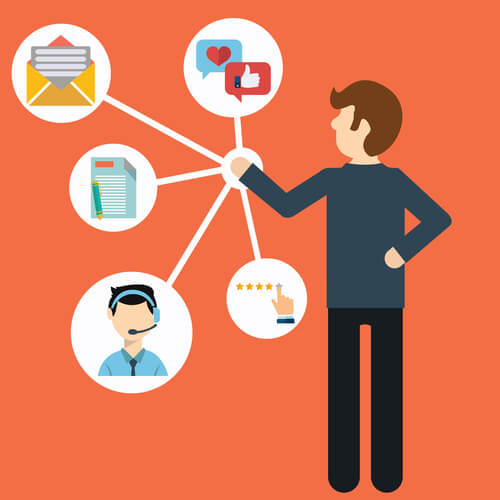A growing small business’s biggest challenge is staying organized while scaling up operations.
Keeping track of projects, deliverables, client communications, billing, customer service, and more can quickly become unwieldy. This is why CRM for small businesses is such a great investment.
What Is Small Business CRM?
CRM stands for Customer Relationship Management. The core functionality of almost every CRM system revolves around storing important business information like customer contact info, order history, communications, and sales opportunities.
The purpose of CRM is to help businesses improve customer relationships by streamlining sales, customer service, and other client-focused processes.
As CRM systems have grown in both popularity and complexity, several makers of CRM software have created products specifically aimed at the small business community, which is what “small business CRM” refers to.
CRM for small business typically offers only basic features, eliminating a lot of the advanced features and functionality that enterprise businesses frequently need due to their scale and complexity of their operations.
Reasons To Buy CRM For Your SMB
It’s easy for many business owners to dismiss CRM as a luxury item that they don’t need. Others may think a CRM system isn’t good fit for the particular type of business they have.
In reality, however, implementing a CRM system often makes an immediate and lasting positive impact regardless of the type of business it’s brought into, and quickly becomes an essential component of day-to-day operations.
Here’s why small business CRM is so useful:
1) Contact Management
The most important and useful function of any and every CRM system is a great contact manager. Keeping track of basic client information like names, phone numbers, and addresses is so crucial, but also so often overlooked.
CRM instantly eliminates the need to try and keep track of client information across several disparate systems. Spreadsheets, business cards, post-its, and email contact lists can all be condensed and contained in one central system that is available from any desktop or mobile device anywhere in the world.
2) Communications Tracking
Working hand-in-hand with contact management, CRM for small business enables users to quickly see all the communications they’ve had with a customer or prospect in a single location. Emails, calls, notes, and anything else related to a particular contact are all visible at a glance.
Having access to all the communications between a business and it’s clients makes it much easier for sales and customer service to quickly understand the history and status of a particular customer or prospect, and move them forward in their respective cycle.
3) Scheduling, Reminders, And Follow-Ups
Imagine calling a customer to check in and see how they’re doing. They may say they’re okay for now but would like a follow up next month after they’re back from vacation. What’s the best way to keep track of that?
You could:
- Write it on a post-it and stick it on your monitor
- Set a reminder in your mobile phone
- Put a note in a spreadsheet somewhere
- Email yourself to remind you to call them
- Assume you’ll remember when the time comes
- Forget about it completely and call them again next week
Any and all of the above are common ways that employees use to remind themselves and keep track of follow-ups with clients. Most of those those solutions, however, almost never work.
What’s worse is that if an employee gets sick, leaves the company, or moves into a different role, the person taking over for them will—at best—have only a piecemeal understanding of what needs to be done for each client.
Scheduling, reminders, and follow-ups, using CRM, can be standardized and automated for each and every client and contact that requires it. Users can log into their dashboard each morning and see exactly what calls need to be made and the reason for those calls.
4) Lead Capture
Almost every small business has a website, and those that do often use some sort of lead or contact form to capture prospective customers. Unfortunately, what happens to those leads after they’ve submitted their contact information is often a total mystery.
There’s a good chance those form submissions go to a “info@businessname.com” or “sales@businessname.com” email address. But who’s checking that email address? Is that person responsible for following up? Is the form even capturing all the information needed to make a quality follow up call or email?
CRM for small business makes it possible for leads captured on the company website to go straight into the CRM system and alert the appropriate person that a new contact has been created. From that point the appropriate next steps can be taken.
5) Marketing
Marketing is such a crucial component of growing a small business, but it’s usually the one effort that gets neglected most frequently. While a small business CRM system can’t solve every marketing need, it can vastly simplify a few key facets of it.
With a central repository of customer and prospect information, a wide range of useful lists can quickly be compiled for marketing purposes.
For example:
- Every customer who has spent more than ‘x’ dollars in the last year
- Prospects within driving distance of the next company event
- Former customers that a business would like to re-engage
- New customers who have just made their first purchase
Lists can usually be created based on any information that is kept at the customer level in a CRM system. This makes is fast and easy to create targeted email campaigns to promote new products, offer discounts to existing customers, or solicit feedback about company performance, among many other uses.
Which CRM System Is Right For You?
If you’ve decided that CRM for small business is right for your business, finding the right solution can be a challenge. The key is to sit down and spend some quality time with your team identifying what problems in your organization you want CRM to solve, and then look for a CRM that meets that criteria.
If your business is currently relying on a certain software package or service, like Google’s Google Workspace, Microsoft Office 365, or a more specialized tool, look for a CRM solution that integrates with what you’re already using, if possible.
Once you’ve found the right CRM, make sure everyone is properly trained to use it. Nothing is worse than spending the time and money on tool that no one uses and is quickly abandoned. However, when you get it right and your CRM system is being used as intended, the increased productivity and ease of operations will make the investment worthwhile.


